

The Combahee River Collective Statement. We are a collective of Black feminists who have been meeting together since 1974. [1] During that time we have been involved in the process of defining and clarifying our politics, while at the same time doing political work within our own group and in coalition with other progressive organizations and movements.
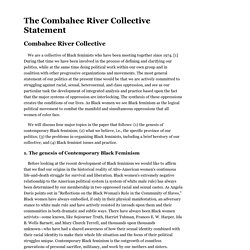
The most general statement of our politics at the present time would be that we are actively committed to struggling against racial, sexual, heterosexual, and class oppression, and see as our particular task the development of integrated analysis and practice based upon the fact that the major systems of oppression are interlocking. The synthesis of these oppressions creates the conditions of our lives. As Black women we see Black feminism as the logical political movement to combat the manifold and simultaneous oppressions that all women of color face. 1.
The genesis of Contemporary Black Feminism 2. 3. The reaction of Black men to feminism has been notoriously negative. 4. A Kind of Memo. Return to Classical Feminist Writings Archive Page Sex and Caste: A Kind of Memo from Casey Hayden and Mary King to a number of other women in the peace and freedom movements by Casey Hayden and Mary King (1965) (Editors Note: Casey Hayden and Mary King circulated this paper on women in the civil rights movement based on their experiences as Student Non-Violent Coordinating Committee volunteers.
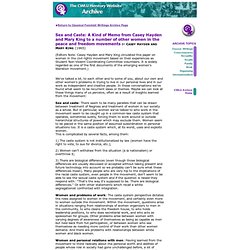
It is widely regarded as one of the first documents of the emerging women's liberation movement.) We've talked a lot, to each other and to some of you, about our own and other women's problems in trying to live in our personal lives and in our work as independent and creative people. In these conversations we've found what seem to be recurrent ideas or themes. Sex and caste: There seem to be many parallels that can be drawn between treatment of Negroes and treatment of women in our society as a whole. 2) Women can't withdraw from the situation (a la nationalism) or overthrow it;
White Privilege: Unpacking the Invisible Knapsack by Peggy McIntosh. White Privilege: Unpacking the Invisible Knapsack "I was taught to see racism only in individual acts of meanness, not in invisible systems conferring dominance on my group" Peggy McIntosh Through work to bring materials from women's studies into the rest of the curriculum, I have often noticed men's unwillingness to grant that they are overprivileged, even though they may grant that women are disadvantaged.
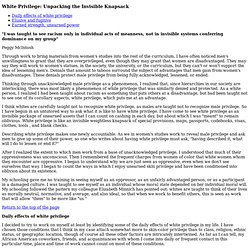
They may say they will work to women's statues, in the society, the university, or the curriculum, but they can't or won't support the idea of lessening men's. Denials that amount to taboos surround the subject of advantages that men gain from women's disadvantages. Thinking through unacknowledged male privilege as a phenomenon, I realized that, since hierarchies in our society are interlocking, there was most likely a phenomenon of while privilege that was similarly denied and protected.
Describing white privilege makes one newly accountable. Return to the top of the page 1. 2. 3. 4. The National Black Feminist Organization s Statement of Purpose, 1973. The National Black Feminist Organizations Statement of Purpose, 1973.
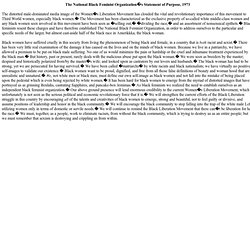
Manifesto. I After centuries of individual and preliminary political struggle, women are uniting to achieve their final liberation from male supremacy.
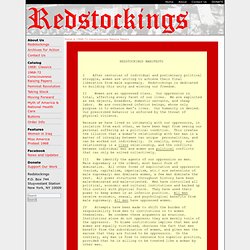
Redstockings is dedicated to building this unity and winning our freedom. II Women are an oppressed class. Our oppression is total, affecting every facet of our lives. We are exploited as sex objects, breeders, domestic servants, and cheap labor. We are considered inferior beings, whose only purpose is to enhance men's lives.
Because we have lived so intimately with our oppressors, in isolation from each other, we have been kept from seeing our personal suffering as a political condition. III We identify the agents of our oppression as men. IV Attempts have been made to shift the burden of responsibility from men to institutions or to women themselves. We also reject the idea that women consent to or are to blame for their own oppression. The most slanderous evasion of all is that women can oppress men. VI We identify with all women. July 7, 1969. The National Organization for Women's 1966 Statement of Purpose.
More about NOW's History NOTICE: This is a historic document, which was adopted at NOW's first National Conference in Washington, D.C. on October 29, 1966.
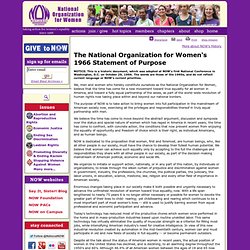
The words are those of the 1960s, and do not reflect current language or NOW's current priorities. We, men and women who hereby constitute ourselves as the National Organization for Women, believe that the time has come for a new movement toward true equality for all women in America, and toward a fully equal partnership of the sexes, as part of the world-wide revolution of human rights now taking place within and beyond our national borders. The purpose of NOW is to take action to bring women into full participation in the mainstream of American society now, exercising all the privileges and responsibilities thereof in truly equal partnership with men. Enormous changes taking place in our society make it both possible and urgently necessary to advance the unfinished revolution of women toward true equality, now.